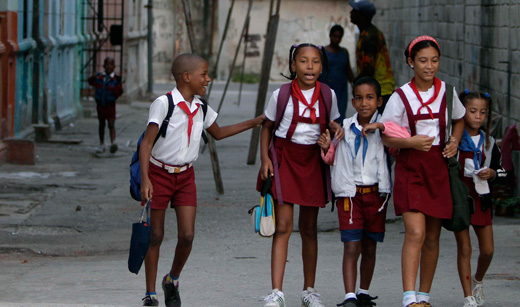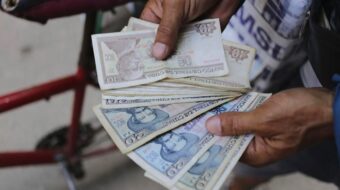
HAVANA (Cuban News Agency) – For sure, neither global crisis nor imperial blockade can wipe away the smile of Cuba’s boys and girls. Cuba puts itself onto a fiesta footing each June 1 to entertain “those they know” who want every happiness, love, and an unforgettable International Children’s Day.
In 1954, the United Nations General Assembly agreed to the annual celebration of a day dedicated to promoting understanding and brotherhood among children of the world, and for promoting their welfare. Each country would decide its own date. The largest of the Antilles islands, like other nations, chose the first of June.
Cuban children can celebrate and they have reason to do so. There will never be enough gratitude and praise for the endless work of achieving love, justice, respect, and safety for children – which the Revolution defends against wind and tides for the sake of its youngest children.
Platitudes, excuses, empty talk? It’s nothing like that. The truth has to be said and repeated, especially when life’s pressures and things taken for granted keep us from not paying due attention to something as certain as that the sun will dawn on Friday, like it always does, with millions of boys and girls around the world deprived of their most elemental rights.
Far from celebrating, the world should be shedding oceans of tears out of anger, pain, and shame for all those who have died, are dying now, and are yet to die through bombs, slave labor, sexual exploitation, pollution, drugs, preventable and curable sicknesses, or the scalpel robbing children of their vital organs, one by one.
The tragedy of a childhood denied or snatched away for millions of human beings, provokes in Cubans a mixture of indignation and relief. We feel safe, like an oasis in the midst of so great a desert. We have the rare privilege of being able to propose plans for ourselves to shore up rights guaranteed for all, equally, including from before birth.
“Cuba is the paradise of childhood and the world ought to look more at that country. It has much to learn there.” This is something José Juan Ortiz Brú, the United Nations Children’s Fund (UNICEF) representative, has said more than once about the island.
We remain quite proud of what we have built for our children and of the achievement of preserving that golden age which is childhood. And that pride is legitimate, in particular because this paradise is not located in cultured Europe or in rich North America, but in a tiny poor country, situated in the global South.
But we must be careful that satisfaction does not lead us to conceited complacency or into believing that inasmuch as the state works, finds solutions, guarantees, and watches over us, we can leave everything in its hands and go to sleep easily resting on our laurels. That’s mostly because in socialist Cuba we are all the state. Each one of us is the Revolution.
No one can assume a hands-off attitude toward the education of a child, or its outlook, its development, and material and spiritual welfare. None of us should stay apart from the family, the school, the community, and society and its institutions. At some point we will influence or even be able to tip the balance for good or evil.
We celebrate this first of June. We have more than enough reasons to do so in this bastion of protected childhood and of hope attained through struggle. But on further reflection: together we put our hands to this work in order to achieve happiness for each boy and girl, to make the dream of a better, more just, full, and equal society possible – step by step.
Additional news item, Prensa Latina, June 1, 2012:
“… Last February during a presentation of a UN report on the state of the world’s children, José Juan Ortiz emphasized that Cuba constituted an example of an egalitarian society with the political will to project children and teenagers …
“Speaking to reporters, the official underscored that Cubans count on education for all, everybody’s right to participate, and being able to play in the street – which doesn’t happen in other nations due to insecurity and violence … For Ortiz, Cuba is a model for fulfillment of the Convention on the Rights of the Child. Cuba’s experience shows the world how education and health care can be free and available for all. He cited facts like Cuba’s infant mortality in 2011 of 4.9 for every 1,000 live births and protection each Cuban child receives through vaccines against 13 illnesses. In its most recent educational report, the National Office of Statistics indicated that for the 2010-11 academic year primary and secondary education finished with an enrollment respectively of 98.7 and 97.9 percent … From a legal point of view the rights of minors are protected by a system of laws that takes their welfare and development into account.”
Photo: Cuban children walk to school in Havana, Cuba. Franklin Reyes/AP












Comments